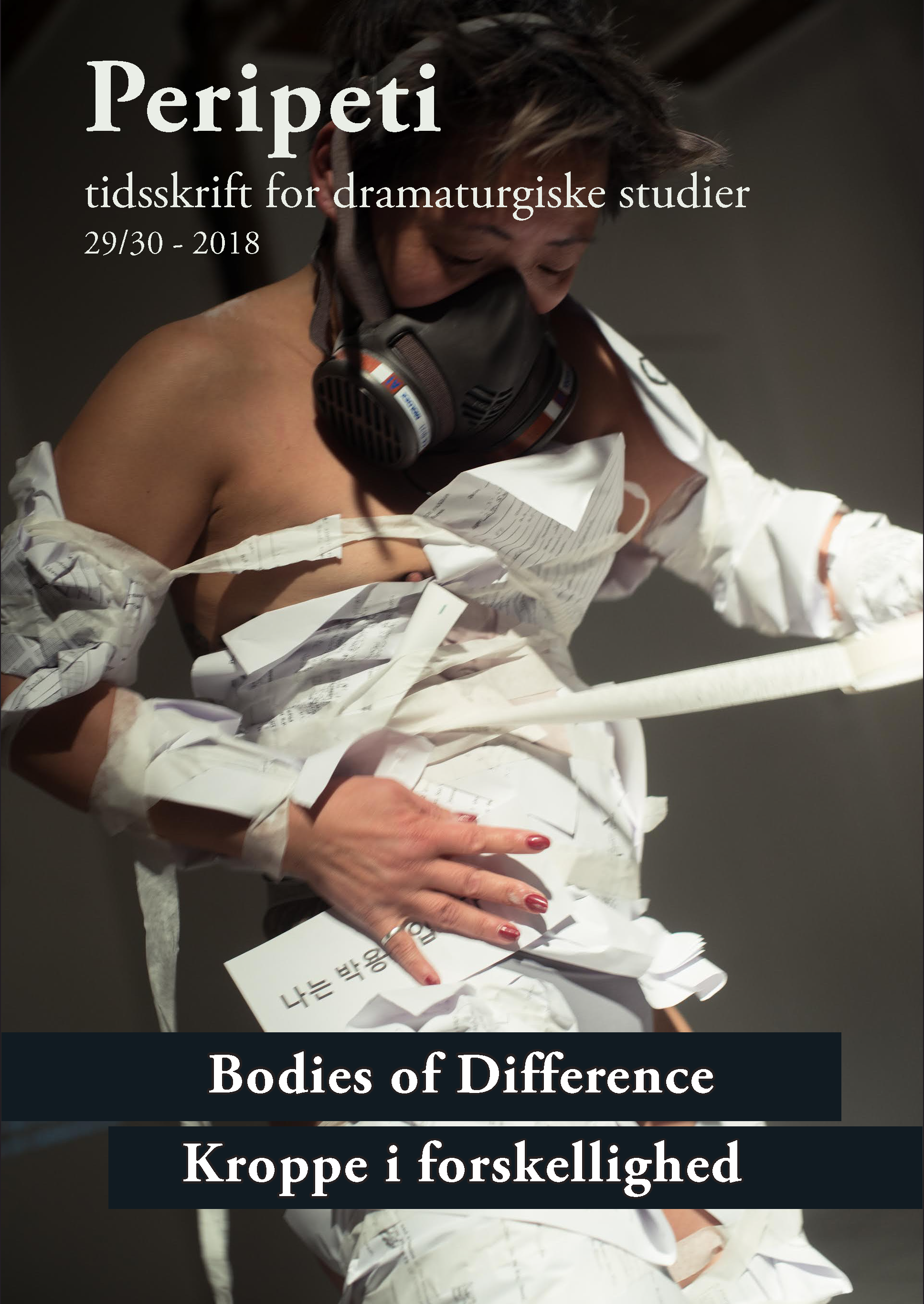Everything You Know About Queerness You Learnt From Blackness
Introducing The Afriquia Theatre of Black Dykes, Crips, Kids and All Their Kin
DOI:
https://doi.org/10.7146/peri.v15i29/30.109630Nøgleord:
Afriquia theatre, Crip, Diaspora, Ubuntu, Afriquia teaterReferencer
Adebayo, M. (2015) ‘Everything You Know About Queerness You Learnt From Blackness: Introducing The Afriquia Theatre of Black Dykes, Crips, Kids’ in Alyson Campbell and Stephen Farrier’s edited collection,
Queer Instruments: International Perspectives Where Performance Leads Queer. Basingstoke: Palgrave Macmillan, pp. 131-150.
Adebayo, M. (2015) ‘Revolutionary Beauty out of Homophobic Hate: A Reflection on the Performance I Stand Corrected’, in White, G. (ed.) Applied Theatre: Aesthetics. London: Bloomsbury Methuen, pp. 123–155.
Bhabha, H. K. (1998) The Location of Culture. London and New York: Routledge.
Butler, J. (1990) Gender Trouble: Feminism and the Subversion of Identity. New York: Routledge.
Case, S.E. (2009) Feminist and Queer Performance: Critical Strategies. Basingstoke: Palgrave Macmillan.
Constantine-Simms, D. (ed.) (2011) Homosexuality in Black Communities. Los Angeles and New York: Alyson Books.
DeFrantz, T. F. and Gonzales, A. (2014) Black Performance Theory. Durham and London: Duke University Press.
Ekine, S. and Abbas, H. (eds) (2013) Queer African Reader. Dakar, Nairobi and Oxford: Pambazuka Press.
Epprecht, M. (2013) Sexuality and Social Justice in Africa: Rethinking Homophobia and Forging Resistance. London and New York: Zed Books.
Eze, M. O. (2010) Intellectual History in Contemporary South Africa. Basingstoke: Palgrave Macmillan.
Fanon, F. (1986) Black Skin, White Masks. London: Pluto Press.
Gilroy, P. (1995) ‘“...to be real”: The Dissident Forms of Black Expressive Culture’, in Ugwu, C. (ed.) Let’s Get it On: The Politics of Black Performance. Seattle: Bay Press, pp. 12–33.
Goddard, L. (2007) Staging Black Feminisms: Identity, Politics, Performance. Basingstoke: Palgrave Macmillan.
Hauser, T. (2007) Muhammad Ali: His Life and Times. London: Pan Books.
hooks, b. (2001) Salvation: Black People and Love. London: The Women’s Press.
Johnson, E. P. (2007) ‘“Quare” Studies, or (Almost) Everything I Know about Queer Studies I Learned from my Grandmother’ in Johnson, E. P. and Henderson, M. (eds) Black Queer Studies: A Critical Anthology. Durham: Duke University Press, pp. 124–157.
Johnson, E. P. (2016) No Tea, No Shade: Writings on Black Queer Studies. Durham and London: Duke University Press.
Lief, J. with A. Thompson (2015). I am because you are: How the Spirit of Ubuntu Inspired an Unlikely Friendship and Transformed a Community. New York: Rodale.
Lorde, A. (1998) ‘Age, Race, Class and Sex: Women Redefining Difference (1986)’, in Rivkin, J. and Ryan, M. (eds) Literary Theory: An Anthology. Oxford: Blackwell, pp. 59–117.
McAvinchey, C. (ed.) (2014) Performance and Community: Commentaries and Case Studies. London: Methuen Drama.McRuer, R. (2006) Crip Theory: Cultural Signs of Queerness and Disability. New York: New York University Press.
Muholi, Z. (2010) Face and Phases. Munich, Berlin, London and New York: Presetel.
Muñoz, J. E. (2013) ‘Feeling Brown, Feeling Down: Latina Affect, The Performativity of Race, and the Depressive Position’, in Hall, D. E., Jagose, A., Bebell, A. and Potter, S. (eds) The Routledge Queer Studies Reader. London: Routledge. pp. 412–421.
Okagbue, O. and Igweonu, K. (2014) Performative Inter-Actions in African Theatre 1: Diaspora Representations and the Interweaving of Cultures. Newcastle: Cambridge Scholars Publishing.
Patton, C. and Sanchez-Eppler, B. (eds) (2000) Queer Diasporas. Durham and London: Duke University Press.
Phelan. P. (1993) Unmarked: The Politics of Performance. London: Routledge.
Puar, J. K. (2007) Terrorist Assemblages: Homonationalism in Queer Times. Durham and London: Duke University Press.
Sanchez, M. C. and Schlossberg, L. (eds) (2001) Passing: Identity and Interpretation in Sexuality, Race and Religion. New York and London: New York University Press.
Sebidi, L. J. (1998). ‘Towards a Definition of African Humanism’ in M. Gideon Khabela and Z.C. Mzoneli (eds) Perspectives on Ubuntu: A Tribute to FEDSEM. Alice: Lovedale Press.
Sedgwick, E. K. (1994) Tendencies. London: Routledge.
Stockton, K. B. (2006) Beautiful Bottom, Beautiful Shame: Where ‘Black’ Meets Queer’. Durham and London: Duke University Press.
Ukaegbu, V. (2007) ‘Grey Silhouettes: Black Queer Theatre on the Post-war British Stage’, in Godiwala, D. (ed.) Alternatives within the Mainstream 2: Queer Theatres in Post-War Britain. Newcastle: Cambridge Scholars Publishing, pp. 322–338.
Wallace, M. (1979) Black Macho and the Myth of the Superwoman. London: John Calder.
Downloads
Publiceret
Citation/Eksport
Nummer
Sektion
Licens
Det følgende vedrører alle Peripeti-udgivelser fra 2024, nr. 39, og senere:
Peripeti er et Diamond Open Access-tidsskrift, der giver direkte open acces til publiceret indhold ud fra princippet om, at det at gøre forskning frit tilgængelig for offentligheden understøtter en større global udveksling af viden.
Forfattere skal ikke betale for indsendelse, redigering eller offentliggørelse af artikler.
Forfattere, der bidrager til Peripeti, bevarer ophavsretten til deres artikler.
Forfattere accepterer at udgive artikler under en Creative Commons CC-BY-NC 4.0-licens. Vilkårene for denne licens tillader brugere frit at kopiere og videredistribuere materialet i ethvert medie eller format og at tilpasse, transformere og bygge videre på materialet, så længe der gives passende kreditering, et link til licensen gives, og eventuelle ændringer angives. Brugere må ikke dele eller tilpasse materialet til kommercielle formål uden samtykke fra licensgiveren. Brugen af licensen må ikke på nogen måde antyde, at licensgiveren støtter tredjeparten eller dennes brug. Licensen kan ikke tilbagekaldes.
Forfattere opfordres til at lægge deres artikler ud på personlige og/eller institutionelle hjemmesider for at sikre endnu større offentlig adgang efter udgivelsen. Forfattere har ret til at arkivere deres artikler i fondes og offentlige institutioners arkiver, men Peripeti anmoder om, at forfattere bruger et direkte link til den publicerede artikel på tidsskriftets hjemmeside, når det er muligt, da Peripeti som en ikke-kommerciel, offentligt finansieret udgiver er afhængig af niveauet af brugeraktivitet på tidsskriftets hjemmeside.
Vedrørende tidligere udgivelser, indtil 2024, herunder nr. 38:
Ophavsretten deles mellem Peripeti og forfatteren/forfatterne. Tidsskriftet er et open access-tidsskrift, der giver direkte adgang til alt indhold baseret på princippet om, at det at gøre forskning frit tilgængelig for offentligheden understøtter en større global udveksling af viden. Brugere kan frit kopiere og dele materiale i ethvert medie eller format, så længe der gives passende kreditering. Enhver anden brug kræver skriftligt samtykke fra indehaverne af ophavsretten.





